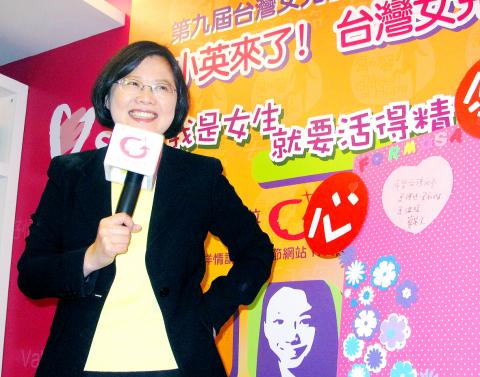|
Women ready, prepared
for political power: Tsai
OVERCOMING TRADITION: Tsai has so far downplayed
gender as an issue in the election, but women voters could yet be the key to her
becoming ROC president
By Vincent Y. Chao / Staff Reporter

Democratic Progressive Party (DPP)
Chairperson and presidential candidate Tsai Ing-wen speaks at a discussion on
female empowerment at the Garden of Hope Foundation in Taipei yesterday.
Photo: CNA
Women are “ready” and “prepared” to take
the nation’s presidency and put to rest traditional concepts about them,
Democratic Progressive Party (DPP) presidential hopeful Tsai Ing-wen (蔡英文) said
yesterday.
“Our time has come and we are ready,” Tsai told a discussion on female
empowerment at the Garden of Hope Foundation in Taipei. “Next year will be an
important test as to whether Taiwanese society can overcome traditional ideas
about women and accept a female leader. There are people who wonder whether it
is possible ... but I believe that the end result will be a good one.”
The remarks drew applause as Tsai, the nation’s first female presidential
candidate representing a major political party, seeks more support among female
voters — a demographic evenly split between her and President Ma Ying-jeou
(馬英九), recent polls showed.
Responding to questions on whether women in politics faced greater difficulties,
Tsai said that “surprisingly,” female candidates had been treated more favorably
in the political arena, adding that more women should become involved.
“Many times we hear people say that as long as it is a female with a high level
of education and good looks, she will be elected. In other words, society is
starting to have a more favorable impression of female politicians,” she said.
Tsai has largely downplayed the gender issue before the upcoming campaign, which
is expected to pick up in earnest in the next two months. Yesterday was one of
the few occasions where she spoke on the subject.
Tsai also commented on a report by the Chinese-language Want Daily saying
Beijing had been exerting pressure on the DPP and Tsai through the American
Institute in Taiwan (AIT) to accept the so-called “1992 consensus.”
The controversial consensus refers to a supposed understanding reached during a
meeting in Hong Kong in 1992 between Taiwanese and Chinese representatives,
under which both sides claim to have acknowledged that there was “one China,”
with each side having its own interpretation of what “one China” means.
The DPP insists that the “1992 consensus” does not exist.
In 2006, former Mainland Affairs Council chairman Su Chi (蘇起) admitted he made
up the term in 2000 before the Chinese Nationalist Party (KMT) handed power over
to the DPP.
The Want Daily quoted unnamed sources as saying that the matter was discussed
between a Chinese Taiwan Affairs Office official and AIT Chairman Raymond
Burghardt in New York last week.
Saying she wasn’t clear on the issue, Tsai, however, countered that “China
should spend some time understanding the substance of Taiwan’s democracy,”
adding that changes in administrations and policies were a “common routine” in
democratic politics.
|
![]()
![]()
![]()